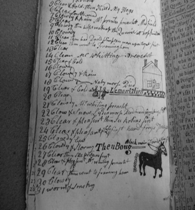By Anna J. Cook
Welcome to the third installment of our Beehive series, “Readers Relate,” in which we bring you a variety of examples of the type of research being done here in the MHS library.
Today’s responses come from Kathryn Segesser, a PhD candidate at the University of Toronto who visited the MHS in early January on an intensive research trip.
1. Can you briefly describe the research project that brought you to the Massachusetts Historical Society?
My research looks at abnormal eating in late eighteenth to early-nineteenth-century America and England. I’m focusing predominantly on medical texts that discuss the causes and nature of both prolonged abstinence from and over-indulgence in eating but I’m also interested in other genres of writing and uncovering personal experiences of such behaviors. I’m essentially trying to see if these eating patterns were conceptualized as more than just physiological, if there emerged an idea that the behaviors resulted from a choice, and if such theories developed in both regions within similar timeframes. I began my American archival research only recently. My visit to the MHS was at the start of this portion of my research and I planned to consult mainly manuscript sources.
2. What specific material in our collections made coming to the MHS important to your research? Was there a specific collection or type of material that you consulted?
I knew that the MHS would be important for the early period I’m studying but there was no one collection I had in mind, given the nature of my topic. I thought that I’d concentrate my attention on the diaries held at the MHS but, although I consulted these, I found a wealth of medical notebooks, records and printed material that I was unaware of prior to arrival. Medical manuscripts, microfilms and printed material all proved valuable.
3. While you were working here, was there something you examined that surprised you? What was it, and why was it surprising?
The diaries I consulted at the MHS were the first eighteenth-century American diaries I’d seen. I expected them to be rather more descriptive and instead found them to briefly record routine daily occurrences. On the other hand I did not expect to find so many medical manuscripts, especially those that contained comprehensive comparisons of treatment methods and reworked notes on select cases. Several manuscripts had incredibly detailed descriptions. For example, Edward Holyoke’s series of notes to the Massachusetts Medical Society contain a wealth of information about the seasons and incidents of disease in 1780s Salem. I hadn’t really seen such localized and consistent reporting of that nature before.
4. Is there a particular quote (or visual image) from the material that you consulted that stands out for you? What is the quote (or image) and why is it important?
There were two sources that really stood out. The first was the State of the Asylum report for the Philadelphia Asylum (Philadelphia, 1821). This source contains the earliest record I’ve found of an American asylum admitting someone for ‘a constant refusal of food previous to admission’. The second was Benjamin Lynde Oliver’s medical notebooks, 1760-1835 (contained in the Oliver Family Papers). In his notes on hydrophobia I found a very early description of the use of what was essentially electric-shock therapy to cure this ‘disease’ as well as separate classifications for ‘genuine’ and ‘hysterical’ hydrophobia. The fact that Oliver separated types of hydrophobia based upon principles of a mental impulse, rather than just physical reactions, is encouraging for my project.
5. If you brought a visitor to the MHS and you had a chance to show them ONE item from our collections, what item would it be?
Although this source did not prove fruitful for my particular research I really enjoyed reading Aaron Wight’s diaries because of the illustrations he drew to accompany his accounts. The drawings helped to immediately indicate the aspects of his life that he was most keen to record. These images, such as this one, from his March 1773 entry, make his notes one of the most visually engaging and lively diaries I’ve seen.
We invited Kathryn to share anything further about her research that Beehive readers might be interested in. She writes:
I am a PhD candidate at the University of Toronto, in my third year of the programe. I’m currently following a summer’s research in England with a term travelling around the north-east American coast. I came to this topic via a previous interest in the institutional treatment as well as the popular use of the idea of insanity in eighteenth-century England. I have chosen to shape my thesis as a comparative analysis in part because there is a considerable degree of information exchange across the Atlantic and in part because discussions of pre-nineteenth-century disordered eating have tended to be Eurocentric. The research I have undertaken so far – both in England and America – suggests that my early theory, that there was an attempt to understand these patterns from a psychological perspective will hold, if perhaps the transition towards such an understanding is fairly tentative.


